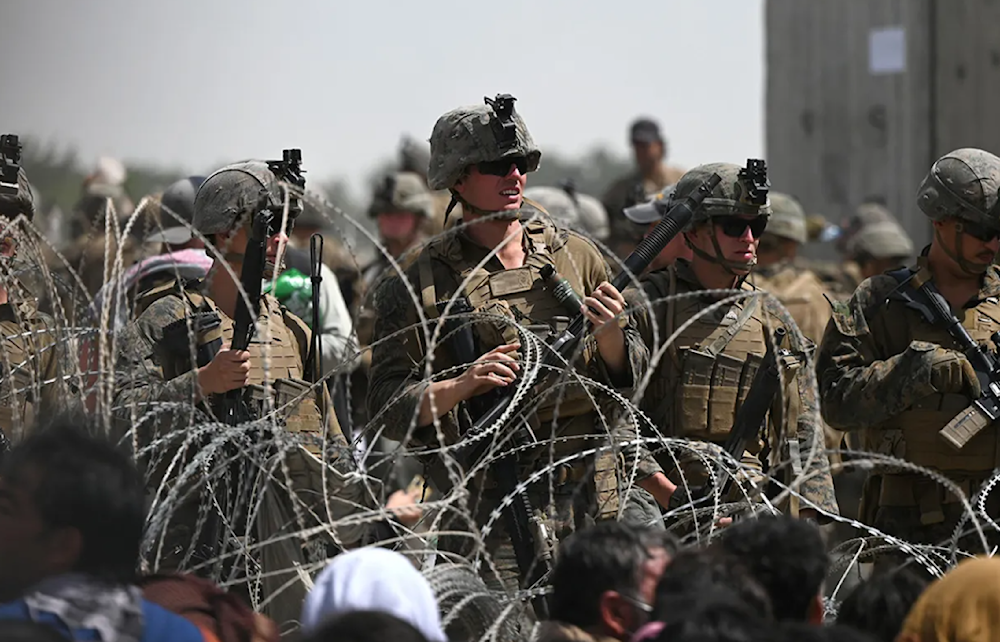Afghanistan withdrawal saga continues, WH calls GOP report 'partisan'
John Kirby tells reporters that the GOP study came two years after their previous report, adding, "This one says little or nothing new."
-

US troops stand behind barbed wire as Afghans sit on a roadside near the military part of the airport of Kabul in Afghanistan in August 2021. (AFP)
The White House responded to a study issued Sunday by Republican legislators criticizing President Biden's chaotic withdrawal from Afghanistan in 2021, calling it "biased" and with "little or nothing new" added.
The report argues that the administration delayed the decision to evacuate noncombatants until August 16, suffered from poor communication both within the US government and with officials in Afghanistan, and mishandled the paperwork for Afghan civilians eligible to leave the country.
The report, stemming from a three-year investigation led by Representative Michael McCaul, the Republican chair of the House Foreign Affairs Committee, highlights significant issues with the US withdrawal from Afghanistan.
The State Department issued its Afghanistan report on June 30, blaming both the Trump and Biden administrations for the catastrophic pullout in August 2021.
John Kirby told reporters that the GOP study came two years after their previous report, adding, "This one says little or nothing new."
He then offered a list of "actual facts" that he deemed appropriate, including the claim that the Taliban only became weaker as Biden's presidency progressed.
Kirby then mentioned what he called "falsehoods" in the study, citing how the Department of Defense advocated deploying extra military forces in the region so that if the decision to evacuate was made, they would be ready to respond.
He also stated that it was pointless to secure Bagram Air Base during the withdrawal since it would have necessitated the deployment of thousands more US troops and a "dangerous trek by evacuees" across Taliban territory, making the evacuation even harder.
Kirby also stated that there was no surrender of US equipment to the Taliban, citing that the equipment left behind was actually those of "Afghan forces when they surrendered or stopped fighting."
Finally, Kirby assured reporters that the Biden administration did not deceive, lie, or refuse to be truthful during or after the withdrawal.
"We did the best we could every day to keep the American people informed of what was happening," according to him. "We conducted our own after-action reports and shared those, too, with the public."
The findings
The House Foreign Affairs Committee report is a 350-page indictment of President Biden’s "determined" decision to withdraw from Afghanistan, despite military warnings that the Afghan government would collapse.
Gen. Kenneth McKenzie, who led the US Central Command at the time, said he was "unequivocal in his advice to the President."
National Security Advisor Jake Sullivan is criticized for allowing Gen. Austin Scott Miller to attend only "a single NSC deputies meeting."
The report highlights failures in evacuation planning, noting that the US Embassy in Kabul expanded due to a “dogmatic insistence” on maintaining a diplomatic presence. It also details how "a significant amount of classified information was left to the Taliban" and describes a chaotic evacuation from Kabul’s civilian airport, resulting in 13 American service members’ deaths and "at least four Afghan civilians, including children," falling from planes.
The Biden Administration’s defense cites Donald Trump’s 2020 deal with the Taliban, but the report criticizes Biden’s decision to withdraw by the 20th anniversary of 9/11 as a "catastrophic political timetable."
The report states the Taliban is still holding seven American citizens, conditions for Afghan women are dire, and Afghanistan is again a haven for ISIS and al-Qaeda, noting that the administration has not conducted a single strike against ISIS since 2021.
The report links the withdrawal to diminished American deterrence, influencing global events like the war in Ukraine and attacks from Yemen's Ansar Allah on Israeli-affiliated ships in the Red Sea.
The report also calls for Vice President Kamala Harris to clarify her stance on Biden’s decision and emphasizes that restoring US deterrence is crucial for future US presidents.

 4 Min Read
4 Min Read








